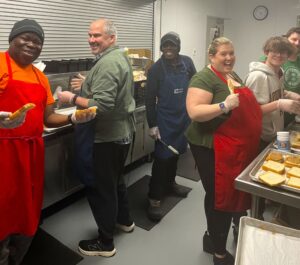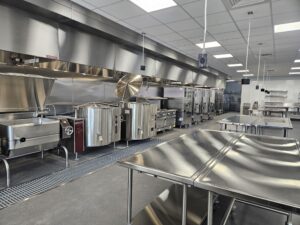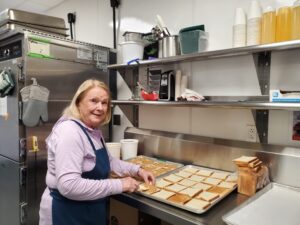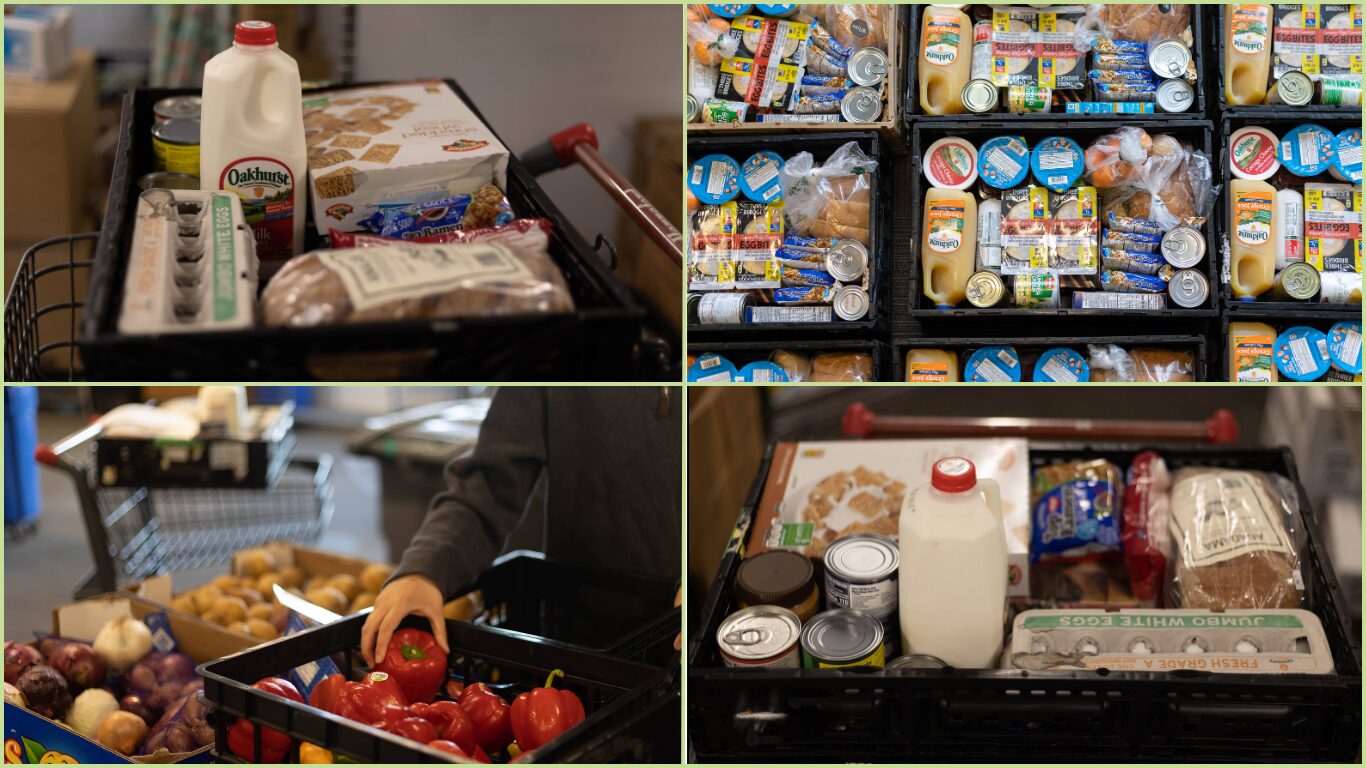Every food box from the Preble Street Food Pantry tells a unique story. Each item inside a food box can tell you something about the person or family who it’s going to, what they might like to eat, and even possibly something about their heritage and culture. Kale is one vegetable that goes into many of our food boxes: it’s a heart-healthy, leafy green and can be used as a substitute by some New Mainer families for vegetables that aren’t as readily available in the U.S.
September is Hunger Action Month, and this month, as with every month, Preble Street is dedicated to meeting immediate food needs in our community and creating long-term solutions for ending hunger in Maine.
The Preble Street Food Pantry, located inside the Preble Street Food Security Hub, is one part of this commitment, providing approximately 30,000 nourishing meals to hundreds of families and individuals each month throughout our state. The Preble Street Food Pantry thoughtfully prepares fresh, healthy, and culturally appropriate food for everyone who receives a food box, always including non-perishable staples, like rice and canned foods.
To reach more people and improve accessibility to services, the Preble Street Pantry operates under a mobile model. Boxes of food are delivered to key drop-off points, like housing communities across Southern Maine, where residents and case managers make pickups.
Mobile pantry services allow us to offer nutritious, culturally appropriate items, specifically requested by residents, as well as some a la carte bulk staples, like milk. Our mobile approach allows us to meet people where they are, both physically and with the food we can provide.
Maine Hunger Initiative
Preble Street’s work on hunger and food security extends beyond our Food Pantry or even the Food Security Hub. In 2008, Preble Street created the Maine Hunger Initiative (MHI) to meet immediate food needs, offset supply shortages, and start work on long-term solutions to hunger in the state of Maine.
Its chief and most important task is to bring an end to soup kitchen and pantry lines by bolstering the capacity of volunteer-run local food pantries, strengthening the emergency food system, creating practices and policies to help Mainers experiencing hunger to become more independent, and to end hunger in Maine with the following:
- Make Maine an anti-hunger leader, particularly in child-related food policies such as the availability of stigma-free school breakfast and lunch, and summer meals for all Maine children
- Improve access to food and other rights that reduce personal poverty and are economic drivers
- Develop best practices and education/training at points of access (e.g. food pantries, Head Start) throughout the state
- Promote policies and funding that benefit both local farmers and Maine families experiencing hunger, decreasing wasted crops and sustaining local agriculture
- Empower people in poverty to increase public awareness of hunger and create solutions
Hunger in Maine: Key Facts
- In 2022, according to Feeding America’s Map the Meal Gap, 13.0% of all people in Maine experience food security, disproportionately affecting people of color
- Put another way, there are 179,680 people experiencing food insecurity in Maine, and 1 out of 8 adults and 1 out of 5 children experience hunger in Maine
- This is on par with the national average, which is about 13.0% across counties and districts in the U.S.
- 52% of food insecure people in Maine do not qualify for SNAP (Supplemental Nutrition Assistance Program) benefits.
- There is an annual food budget shortfall of more than 141-million dollars in Maine.
- As of 2022, Maine is ranked first in New England for household food insecurity and 21st in the nation, tied with two other states.
Thank you to our partners who make this work possible...
Almost all of the food distributed through the Food Pantry comes from USDA government surplus commodities, is donated by local retail and wholesale distributors, farms, and bakeries — including Whole Foods, Hannaford, Trader Joe’s, Jordan’s Farm, and Tandem Coffee Roasters — comes from our partner Good Shepherd Food Bank; or is collected in food drives by the faith community, schools, organizations, and businesses.

Fostering connection through food
Preble Street Food Programs is committed to providing the most nutritious, delicious, and balanced meals possible for people struggling with food insecurity in Maine. While recent updates to the Preble Street Food Security Hub have made this easier, there are still unique challenges. We rely on donations, meaning we often don’t know what ingredients we

Feeding Maine sustainably
Climate change affects everyone, but people living in poverty — especially people living outside — are most vulnerable to rising temperatures, natural disasters, and global threats to food security. Sustainability is built in at the Preble Street Food Security Hub (FSH), where we address urgent food security needs. The Food Security Hub is currently undergoing

Betty: A volunteer’s story
Betty Haymon has been volunteering at Preble Street every month for 25 years. In the summer of 2000, she signed up to do the breakfast shift at the Resource Center Soup Kitchen on the first Saturday of each month. Shortly after, she was given a tour of the Teen Center and told that their kitchen

